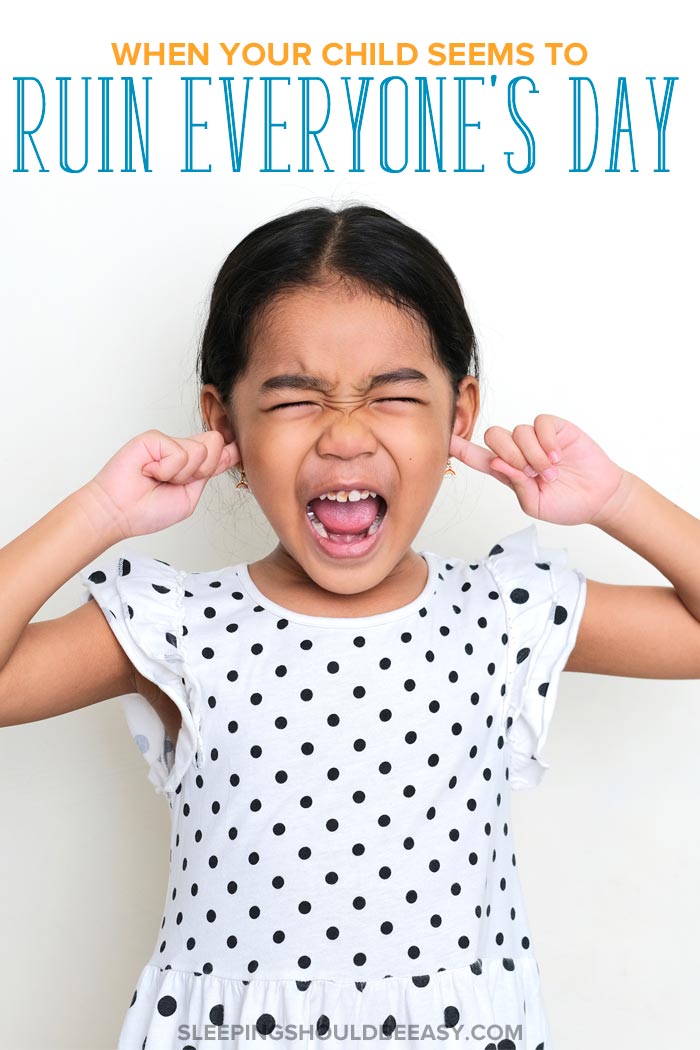When Your Child Ruins Everyone’s Day
What to do when your child ruins everyone’s day with frequent tantrums and outbursts? Learn how to turn a bad day around and embrace her temperament.
 Does it feel like your child seems disagreeable nearly all the time, crying and throwing a tantrum every day? Her emotional dial is set to extreme, with every response an outburst. Once in a while she’ll comply, but on most days, she’s defiant and rude.
Does it feel like your child seems disagreeable nearly all the time, crying and throwing a tantrum every day? Her emotional dial is set to extreme, with every response an outburst. Once in a while she’ll comply, but on most days, she’s defiant and rude.
You try to have fun by taking the family to a restaurant or buying the kids new toys. But of course, she throws a fit about leaving too soon and gets jealous about her brother’s toy. While everyone else is enjoying themselves and feeling grateful, she can’t seem to be happy about anything.
And when you compare her to her siblings, you can’t help but notice the stark difference between their personalities.
In short, she’s the one person in the family with the power to ruin everyone’s day.
I know I’ve had days where I felt exasperated by the “switch” just one child can turn on. A meltdown, a tantrum—and the whole day is ruined. We’d be playing a board game without one of the kids, and you suddenly realize how smoothly everything can flow.
And you think, So THIS is how peaceful it can be.
If you can relate, don’t worry. For one thing, this isn’t forever—below, I’ll share several mindset and tactical changes you can make to turn things around.
Feeling frustrated is also normal, even with just one child. Everyone has a different temperament, which doesn’t mean you love him any less than your other kids. You simply need to find new ways to meet his needs and provide him with boundaries.
Here’s how:
Table of Contents
1. Show empathy and acknowledge your child’s emotions
The first step in being on the same side? Show empathy for your child’s emotions. Don’t launch into a lecture or bend to her every demand. Instead, start with acknowledging what she’s feeling and how difficult it must be for her.
If she screams, don’t scream back and tell her to go to her room—and don’t even try to appease her. Instead, acknowledge her frustration. You might say, “You seem mad. I would feel mad too if we had to leave right when I was having fun.”
You’ll likely notice a shift in her behavior. She may have been gearing up for another argument, but instead, she’ll soften, surprised to feel heard. She’ll feel safe in your calmness instead of spiraling down into more bad behavior.
The best reassurance for her? She realizes that her behavior hasn’t scared you off. That you’ll love her no matter what, screaming and everything.
Free printable: Join my newsletter and grab The Power of Empathy! Learn how to prevent power struggles, all by understanding her perspective. Get it below—at no cost to you:
2. Be on the same side
The screaming, the standoffs, the sulking. No wonder it’s hard to enjoy your child’s company when that’s how she behaves. These arguments feel like a battle between the two of you.
But instead of resenting her behavior, look at the screaming and sulking as a cry for help.
She needs you, especially in this moment. As frustrating as her behavior may be, she still needs you to be the calm and reasonable person between the two of you. When she’s upset, she’s afraid…
- You’ll reject her for feeling or acting in negative ways.
- Her emotions are so strong even you can’t stop them.
- She’s a bad person.
No matter how defiantly she’s behaving, she needs your help managing her emotions.
You won’t always get this right, and you’ll still get frustrated from time to time (I know I do). Still, think of the both of you as being on the same side. Imagine you’re the teacher and she the student, both hoping she’ll learn the tools to behave.
3. Put your foot down
Children need limits. They can explore and express themselves, but only within safe boundaries. As ironic as it may seem, your toddler actually craves limits as a way to define how to behave and what to expect.
So. put your foot down, kindly but firmly. Let him know what is and isn’t allowed, and the consequences if he doesn’t fulfill his responsibilities.
And don’t take the “because I said so” tone. Instead, explain the rules and consequences as a teacher would—in a matter of fact way. Your goal is to help him manage his emotions and behave in a better way, not win every battle.
Learn more about setting boundaries with kids.

4. Teach your child to express her feelings
Sometimes we send the message that certain emotions are wrong. We tell kids to go to their room when they’re throwing a tantrum and scold them to stop crying. We refuse to hug them when they just misbehaved.
But withholding affection doesn’t keep your child from misbehaving further. It only sends the message that your love depends on her behavior.
Instead, explain that her emotions are normal, but that she needs to express them better. The best way to teach good behavior is to model it yourself and behave in a way you’d want her to behave.
Then, tell her how she can better express her frustration. A few suggestions:
- Label emotions so she knows what these feelings mean. Instead of yelling, she can say, “I’m mad!”
- Suggest she hold a comfort item like a favorite toy. She knows she can grab her favorite teddy bear when she feels upset. One of my kids would run to his favorite stuffed animal for comfort when he was upset.
- If she feels overwhelmed, she can find a quiet space or go to her room for alone time. Some young children benefit from solitude when they feel upset. Another one of my kids knew to go to his room when the rest of the house felt loud and overwhelming.
- Show more appropriate ways to speak. If she’s rude to a sibling, tell her, “You can say, ‘I don’t like how you did that’ instead of yelling.”
Rather than jumping on her behavior, show her how to communicate in appropriate ways. This takes a lot of reminding, but as she grows, she’ll remember how to express herself without getting too upset.
Conclusion
Unlike other relationships in our lives like our friends and partners, we don’t choose our kids. We’re expected to love and care for them regardless of how smoothly their personalities mesh with our own.
So, when they have a difficult temperament, it’s not always easy to enjoy spending quality time with them. It’s tempting to blame them for a bad parenting day or resent them for behaving the way they do.
Instead, think of yourself as being on the same side, guiding your child to behave better. Acknowledge her emotions to avoid epic battles, and make her feel heard. Put your foot down to give her the guidance and boundaries she craves. And show her appropriate ways to communicate her frustrations.
You can have a positive parent-child relationship, one where an outburst won’t ruin everyone’s day, but can become a teachable moment for the both of you.
Get more tips:
- The Biggest Reason Parents Should Stand Their Ground
- Why Time Outs Don’t Work (And What to Do Instead)
- On Accepting Your Children for Who They Are
Don’t forget: Join my newsletter and grab your copy of The Power of Empathy below—at no cost to you:






